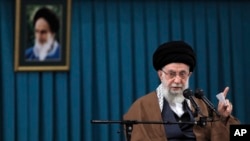Iranian political experts and social media users have been criticizing Supreme Leader Ayatollah Ali Khamenei after he ruled out holding popular referendums on state policies this week.
Iran faced massive anti-government protests last year, prompting former President Hassan Rouhani to suggest holding referendums on domestic and foreign policies.
Iran's supreme leader rejected the idea. He also said that he is against it because "not all people have the power to analyze the issue which is put to the referendum."
Hamed Sheibani Rad, a political activist living in France, told VOA's Persian Service that "after 44 years, there has been no change" in the thinking that formed the Islamic Republic and "it can be seen in Khamenei's recent words about the people's incompetence for analyzing issues and making the right choice in the referendum."
Sheibani Rad, the interim spokesman of the New Iran Party, emphasized: "The regime arising from the red and black philosophy has neither changed nor can it change, but it can be overthrown."
Mahmoud Moradkhani, Khamenei's nephew, tweeted on Wednesday, "Referendum and elections are meaningful in Ali Khamenei's view only when he determines the result in advance."
According to Moradkhani, who opposes the Islamic Republic, "Ali Khamenei says: Yes to appointments, never to elections!"
Iran's presidential and parliamentary elections are overseen by clerical bodies. Under Iran's constitution, a referendum is only possible if two-thirds of parliament votes for it and a 12-member constitutional body approves.
Some material is from The Associated Press.






